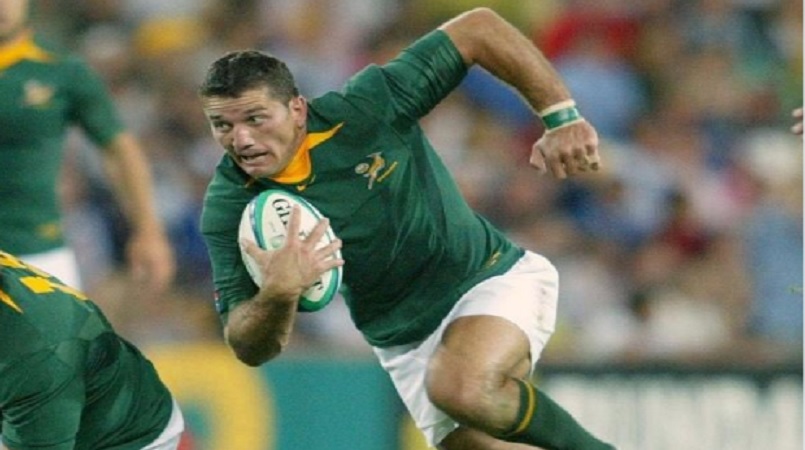
Former South Africa captain Joost van der Westhuizen has died aged 45, six years after he was diagnosed with the debilitating motor neurone disease.
Van der Westhuizen won the World Cup with the Springboks in 1995.
Regarded as one of the finest scrum-halves in history, he won 89 international caps between 1993 and 2003, scoring 38 tries.
He captained the Springboks for four years, including at the 1999 World Cup, before his retirement in 2003.
Van der Westhuizen was admitted to hospital in Johannesburg on Saturday, when he was said to be in a "critical condition".
"Joost will be remembered as one of the greatest Springboks - not only of his generation, but of all time," said South Africa Rugby president Mark Alexander.
"He also became an inspiration and hero to many fellow sufferers of this terrible disease as well as to those unaffected.
"We all marvelled at his bravery, his fortitude and his uncomplaining acceptance of this terrible burden."
A record-breaking career
Van der Westhuizen made his Springboks debut the year after the team were readmitted to international rugby and was their record try-scorer until Bryan Habana surpassed him in 2011.
He will be best remembered for his major role in the Springboks lifting the World Cup on home soil, beating New Zealand in the final.
After winning the Tri-Nations Championship in 1998, he was named captain for the 1999 World Cup - at which South Africa finished third - before retiring after defeat by New Zealand in the quarter-finals of the 2003 tournament.
At the time of his retirement, his 89 Tests made him the most-capped South African of all time, though five players have since won more caps.
After being diagnosed with MND, a rare condition that progressively damages parts of the nervous system and impacts on important muscle activity such as walking, speaking and breathing, he set up the J9 Foundation, which provides support and care to people with the disease.
Wales interim coach Rob Howley said he was "devastated" by his fellow former scrum-half's death.
"He was a fantastic rugby player and for me was the best nine I played against," Howley said.
"He was a world-class nine who was respected throughout the rugby world.
"I have been fortunate enough to play against him and enjoy his company off the pitch and it is tragic he has passed so young."
England coach Eddie Jones, who coached against Van der Westhuizen during his time in Super Rugby, also paid his tribute.
"He was an absolutely outstanding player, a very good long-passer with a great kicking game, a terrific defender and a guy who really influenced the players," he told BBC Sport.
"Having coached against him when he played for the Bulls, they were a completely different team with him playing and he will be sorely missed.
"You had to be very tight around the ruck when you played against him because he was a great sniper. He was such a big guy who had good pace and was difficult to defend against.
"It is so sad to hear of his death. You feel for his family and supporters of South African rugby."
'It became an iconic moment'
Former South Africa captain Jean de Villiers says Van der Westhuizen will be remembered as one of the best to play for the Springboks.
"What he achieved on the rugby field was unbelievable," he told BBC Radio 5 live.
De Villiers remembers Van der Westhuizen's tackle on New Zealand great Jonah Lomu, who died at the age of 40 in November 2015, in the 1995 World Cup final as an "iconic moment in the game".
"The sad thing is that neither of them are with us any more," he added.
"Joost's tackle on Jonah that day - a front on tackle on the guy that was destroying every team in the world. Here comes a scrum-half, someone who is not meant to put in tackles like that, and tackles him front on.
"The team as a whole got so much inspiration from him for doing that. For us as a country it became an iconic day and it changed the way that we were viewed forever."
De Villiers says Van der Westhuizen's contribution to raising awareness of motor neuron disease will be remembered as much as his rugby achievements.
"He never gave up," he said. "He gained so much respect in the latter part of his life, even though he was so successful on the rugby field as well."
Former South African captain Corne Krige added: "If you wanted an X factor in your team - he was that guy.
"He was the ultimate modern day scrum-half - first of the bigger scrum-halves in the world. It's tragic for his family and for his kids and for everyone involved."
